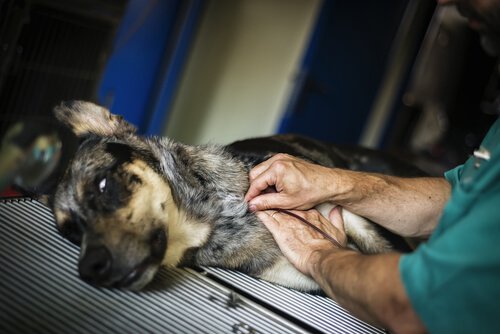A Blood Bank for Dogs in Taiwan

Despite the bad news about animal abuse that we hear about on a daily basis, little by little there seems to be more awareness about the care and respect that these living beings deserve. A great example of this is the National Pingtung University of Science and Technology which opened Taiwan’s first blood bank for dogs.
Blood banks for dogs: few but increasing
Those behind the idea of this blood bank for dogs are hoping that these types of centers will eventually expand to include cats and other animals. Also, they’re proposing the idea of taking the service to other parts of the island to start researching chronic diseases in dogs.
While many countries have blood banks for animals, a lot of them are private ventures. So, they won’t cater to all of the animals that may need a donation at some point in their lives.
With the inauguration of this center, Taiwan joins countries like Mexico, which opened a veterinary blood bank in Yucatan in 2015. Another example is Spain, which also has one in the Clinical Veterinary Hospital of the Complutense University of Madrid.

A blood bank for dogs was created in Taiwan. This is great news which we hope will help raise awareness about the importance of donating this component, which is so vital for both humans and animals.
A blood bank for dogs creates awareness
Like all new things, the opening of this blood bank for dogs aroused the interest of many pet lovers. Not only that, but they also brought their dogs to donate blood.
Currently, most of the donors are dogs belonging to veterinary students at Pingtung University.
That’s why it’s important to point out that, just like with humans, it’s not easy to find donors. So, initiatives like the one should serve as examples to encourage more donations.
Know the requirements for a dog to become a blood donor
To donate blood, dogs must meet the following requirements:
- Be between 1 and 8 years old.
- Weigh more than 20 kilograms.
- Have an up-to-date vaccination card.
- Be dewormed every 4 months.
- No problems with coagulation.
- No diseases that can be transmitted through the blood. For example, filariasis, leishmaniasis, borreliosis, babesiosis, brucellosis, and ehrlichiosis.
What is the donation procedure like?
The procedure for blood donation for dogs is similar to the one for humans.
The vets will place the dog on the table and shave a small area around the neck. There, they will insert the needle and extract about 15 liquid ounces of blood.
This process takes between 20 and 40 minutes and can be repeated on a quarterly basis. They will then store the blood for 35 days and let the red blood cells concentrate for 20 days. As for the plasma, it will stay frozen for one year.
Make your dog a blood donor
Hopefully, this news coming from Taiwan will encourage you to make your dog a regular blood donor.
If so, then you should know a few things. Although some dogs may feel somewhat weak after donating blood, the vast majority don’t have any adverse reactions. In addition, they recover faster from donating than people do.
Additionally, you should know that a single donation can save two lives. This is because the blood is separated into two components: red blood cells and plasma.
More information about blood donation for dogs

These are a few other things that you should keep in mind in relation to blood donation for dogs:
- Dogs have 8 different blood types
- Transfusions can only be made when the animals have the same blood type or have compatible types.
- DEA 1 is the ‘universal’ blood type and is compatible with all other types. Greyhounds have this blood type, so they are ideal donors.
- Labradors are also great donors because they’re very calm animals. This will make for a smooth extraction process.
All cited sources were thoroughly reviewed by our team to ensure their quality, reliability, currency, and validity. The bibliography of this article was considered reliable and of academic or scientific accuracy.
- Acierno, M. M., Raj, K., & Giger, U. (2014). DEA 1 expression on dog erythrocytes analyzed by immunochromatographic and flow cytometric techniques. Journal of Veterinary Internal Medicine. https://doi.org/10.1111/jvim.12321
-
Hohenhaus, A. E. (2004). Importance of Blood Groups and Blood Group Antibodies in Companion Animals. Transfusion Medicine Reviews. https://doi.org/10.1016/j.tmrv.2003.12.003